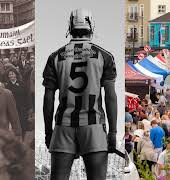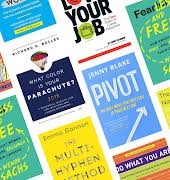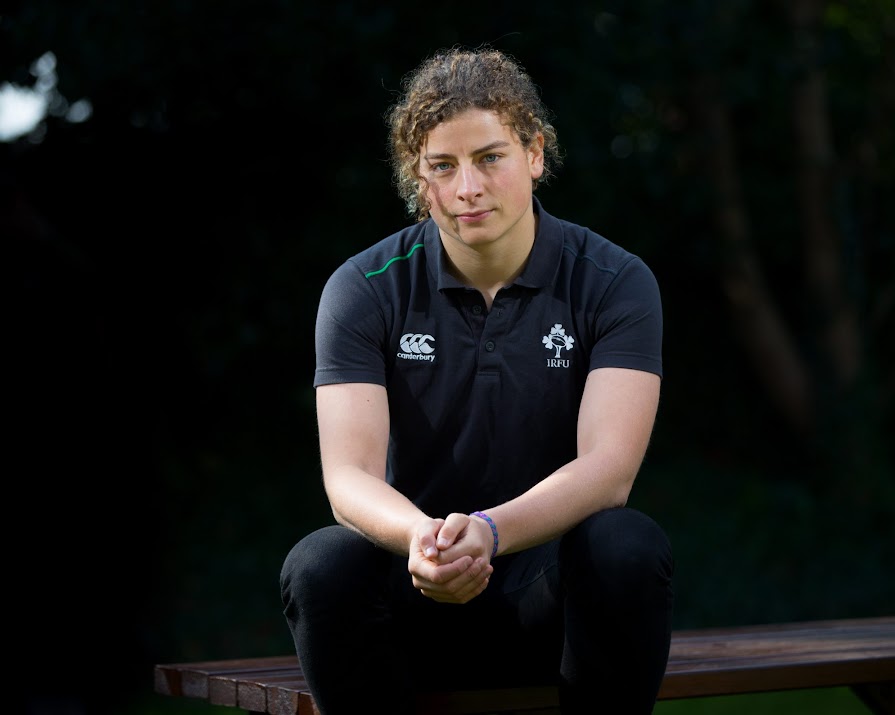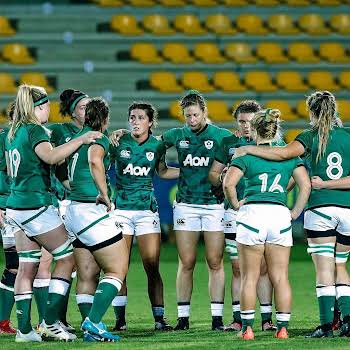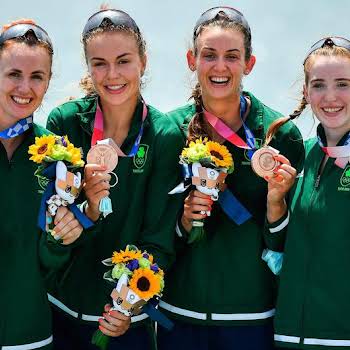
‘When you invest in women’s sports, good things happen’: Jenny Murphy’s road back to rugby
By Erin Lindsay
02nd May 2018
02nd May 2018
Jenny Murphy is a tough Irish woman. She’s played rugby for her country and cites it as one of her proudest achievements. But her biggest challenge was when her success was cut short by injury- not once, but twice. Now, Jenny is focusing on recovering for her own sake as well as her teams’. With time on her hands, she has the space to reflect on what makes a rugby player so successful, especially as a woman, as she’s written about in her recent piece for the Sports Chronicle.
It all began for Jenny when she was young, knowing that she had a knack for sport. “When I was younger, I was always mad about sport. I joined my local soccer team, played GAA, did everything but I was always best suited to rugby. I was constantly bumping into things and going at it full force, and in rugby, they encouraged that physicality.
I remember when I first saw Roy Keane playing for Ireland and singing Amhrán na bhFiann and that was what I wanted. I knew I lacked the finesse of soccer players but I kept trying – I threw myself into GAA and built the foundations for rugby for when I eventually found it.”
Jenny found it in London, where she had moved to go to college, and according to her, “things started to snowball from there”. In 2012, she was called up to play for the Irish Exiles Team against Ireland. “We were beaten badly but I obviously must have done something right, because I ended up getting a call to play for the Irish squad soon after.”
And so it began. Jenny played for the Irish team until 2015 to great success, but as rugby players know, injury can always be just around the corner. In August of that year, Jenny sustained a back injury that put her out of action for almost 16 months. “They still aren’t sure what exactly happened but it was my toughest injury to recover from. I was uncomfortable and in pain all the time. I had a few surgeries but its still an issue”.
For Jenny, the thought of having her dream fall apart was almost as bad as the injury itself. “That was really the ultimate fear; thinking that I’d found something I loved and was good at, and I could do, but then being faced with the possibility of not being able to do it anymore. I got to the point when I was like: ‘OK, if this ends, I am so lucky to have played for Ireland’. But I didn’t want it to end.”
Thankfully, it wasn’t the end. Jenny eventually recovered enough to play again. She took the time to improve her game and to gear up for the Six Nations this year. Everything was back on track… until it wasn’t. Jenny tore her ACL and had to get major surgery. Now, her sights don’t lie on training; they lie on being able to walk properly again.
Mindset
I wonder what Jenny’s mentality is to injury and to recovery. Rugby is such a physical sport and you’d imagine that injury is always in the back of players’ minds, but that it still devastates when it happens. “It’s not necessarily the fact that I play a contact sport that means I can deal with injury. I know lots of people who play soccer, for example, who’ve had setbacks like this,” she says. “It’s more so about being older and being able to be grateful for playing at all. I know that playing rugby doesn’t define my whole being – I’m good at other things and if I couldnt play rugby, I’d be devastated but id deal with it.”
Her maturity and down-to-earth nature means that Jenny is well able to deal with anything that rugby throws her way. But making a career in sport means being a woman in what is often a man’s world. However, Jenny has largely experienced only good reactions to her playing. “People are really great about women’s rugby. The fans love it and even people who don’t follow rugby, who might be surprised to hear that you play for Ireland, are so impressed and supportive. There are, of course, one or two people who will say that women can’t play rugby, but I really have no interest in their opinion anyway”.
Some instances of sexism do manage to creep in. In a competitive match a few years ago, Jenny tackled an opponent to the ground, which saw a penalty awarded to the other team. All part and parcel of the game. Except for one thing.
“Apologise to her!”
“The referee started screaming at me to apologise to her”, Jenny remembers. “It was the strangest thing I’ve ever experienced during a match. As a rugby player, you’re kind of used to being seen as a tackle bag, and it’s part of the job to get physical in that sense. So when I was called out and told to apologise, I was so taken aback and surprised by it that I just said I was sorry. It was only afterwards, as I was walking away, that it started to click that that was crazy.”
“No male would ever have been asked to do that,” she says. “I always ask myself when playing if a man would have to do something, and if he wouldn’t, then I don’t do it either. But I will say that my coach was livid, absolutely livid and he did stand up for me.”
Is it important, then, for men in the industry to stand up for women? Jenny considers it. “Any voice standing up for equality is valid,” she says. “Men standing up is great to see, but if a woman had stood up to call out that ref, it would have been equally as great. I think, as long as someone is representing equality, then we should listen.”
But not all sexism in sport can be fixed with a word to the referee. The trend of female sports players being under-compensated for their craft is widespread, with women’s teams often facing less funding and less support, even at international level. The recognition is long overdue, Jenny says.
“Playing for my country is the best thing I’ve ever done. But as a female, we have to have our careers in our minds all the time and consider the financial strain of playing for such a big team. I’m lucky that my employers are great, and are very supportive of my playing rugby, but many others aren’t so lucky. The RFU in England has said that they are committed to paying female players at club level and I do hope I get to see that here in Ireland at some stage. Hopefully, there’ll come a time where women won’t have to worry about finances to play for their country.”
How to improve the game
When I ask Jenny how she would improve the game for young female rugby players, there no sign of vague affirmations of equal rights. Jenny has practical and workable solutions.
“I’d like to see an under-20’s squad for women brought in. At a grassroots level, I really think that would make a huge difference in encouraging more women to play,” she says. “Because there’s only a top tier for Irish women’s rugby, the jump from club level to international level is huge and can be hard to navigate. The game is progressing so fast, and players are getting stronger and faster, and it doesn’t allow much time to get used to it when you’re new. We’re very lucky to have amazing mentors in the sport, but we still need more support.
It’s clear that Jenny thinks a lot about the big picture for the sport. What does she think about her own big picture – where will her career go from here? “I’m the type of person who only looks at the next chapter, never at the big picture,” she says. “I never thought I would ever play rugby for Ireland, it just happened that way and I was really lucky. I am just always chasing success, and I’ll continue to do that.
But I’m not thinking about rugby too much right now; my goals consist of being able to walk up the stairs at this point!” But will she return to the Irish team? “I do obviously have the ambition to play for Ireland again, but I don’t have a set timeline right now as to how I’ll get back there. Once you have a taste of playing for your country, you don’t want to give it up. But I definitely do not want to stop playing rugby; whether that’s at country, province or club level”.
Wherever Jenny ends up playing, it’s clear that she’ll be playing for Irish women, not just for herself. She’s a strong believer in advocating women in sport and we can already see the results. “At every level and in every country, you can see that when you invest in women’s sports, good things happen, especially if you invest early. I’m glad to see now that because the performances are sharper, and we’re doing better than ever, there are more people coming to the games.
I want to get rid of the whole idea of the ‘women’s game’. People just want to see Ireland play, and now, it just so happens that it’s women on the pitch”.
Photo: Inpho
While we have you here, make sure to go and listen to our podcast The Spill. This week’s episode kicks off with an examination of Janelle Monaé’s PYNK, which features her and her fellow dancers in opulent pink vagina trousers. Sophie and Rhona go on to discuss if people are treated differently because of their level of beauty and finish by helping a reader who can’t stop fantasising about women.


